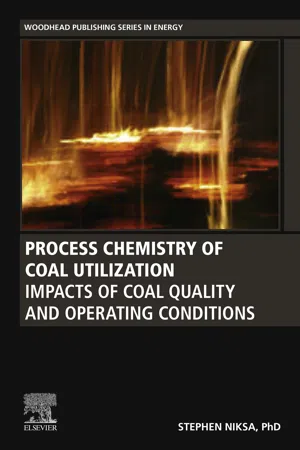
Process Chemistry of Coal Utilization
Impacts of Coal Quality and Operating Conditions
- 486 pages
- English
- ePUB (mobile friendly)
- Available on iOS & Android
About this book
Process Chemistry of Coal Utilization: Reaction Mechanisms for Coal Decomposition and Volatiles Conversion relates major advances in coal science on how to interpret performance data from lab, pilot and commercial scales. The book presents a very broad range of quantitative methods, from statistical regressions, to rudimentary models, CFD and comprehensive reaction mechanisms. Combining the latest research in the field, including an abundance of lab datasets, the book illustrates how a particular operating condition affects a specific coal-based reaction system. Managers who use these tactics will be able to tailor their testing and simulation work to effectively characterize and solve their problems.- Compiles fully validated reaction mechanisms that accurately depict the coal quality impacts in all major coal utilization technologies- Includes an abundance of lab datasets that clearly illustrate how operating conditions affect coal-based reaction systems
Frequently asked questions
- Essential is ideal for learners and professionals who enjoy exploring a wide range of subjects. Access the Essential Library with 800,000+ trusted titles and best-sellers across business, personal growth, and the humanities. Includes unlimited reading time and Standard Read Aloud voice.
- Complete: Perfect for advanced learners and researchers needing full, unrestricted access. Unlock 1.4M+ books across hundreds of subjects, including academic and specialized titles. The Complete Plan also includes advanced features like Premium Read Aloud and Research Assistant.
Please note we cannot support devices running on iOS 13 and Android 7 or earlier. Learn more about using the app.
Information
Table of contents
- Cover image
- Title page
- Table of Contents
- Copyright
- Preface
- Acronyms
- 1: Coal utilization technologies
- 2: Fuel quality, thermophysical properties, and transport coefficients
- 3: Moisture release and coal drying
- 4: Primary devolatilization behavior
- 5: Reaction mechanisms for primary devolatilization
- 6: Quantitative interpretations of primary devolatilization behavior
- 7: Tar decomposition
- 8: Volatiles reforming and volatiles combustion
- 9: Hydropyrolysis and hydrogasification
- Index